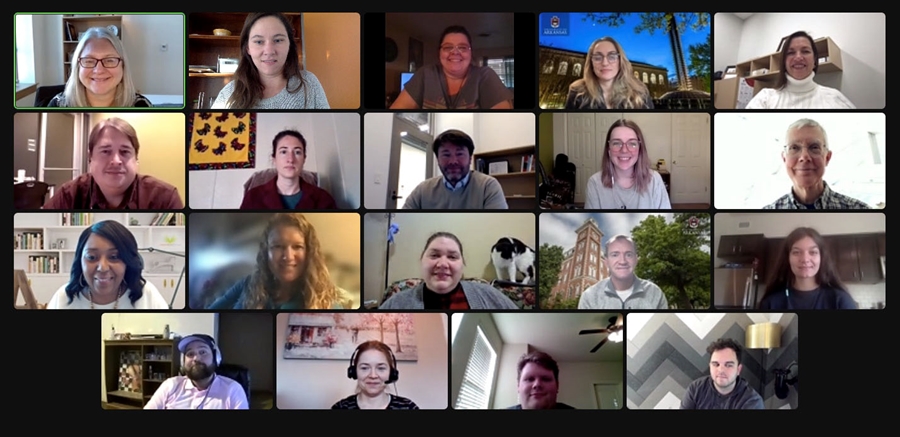The U of A strives to offer all students a place where they can connect with multiple resources to help them succeed.
One such program in the Fulbright College of Arts and Sciences has invited instructors to also serve as academic coaches who work one-on-one with students to help them improve their college experience. This mentoring may include helping students with campus maneuverability, their class experiences, or encouraging them to participate in various on-campus programs.
The goal is for students to have a place and person to go for any type of assistance — personal or campus-related — that may help, especially if they are experiencing learning challenges.
"During the spring 2022 semester, seven new instructor coaches will be joining the team for a total of 20," said Deborah Korth, director of student success for the Fulbright College of Arts and Sciences and a teaching professor. "Their focus will be on supporting students who are having academic difficulties, paying close attention to students who have not earned enough credit hours to progress to the next level."
More than 450 students participated in the instructor coach program last fall, according to Korth, and many students have had positive outcomes.
Participating student Madison Glover described herself as shy and said she struggles in new environments. Glover said the old adage, "closed mouths don't get fed," really resonates with her because she believes that if you do not speak up, you are not going to get help.
"I had to realize this early on in college since I am a shy person around most people or when I am new to an environment," Glover said. "[Instructor] coaching is a great resource to have as a student because you may not want to ask a question in class, or you might have trouble understanding an assignment and want to talk to your professor or anyone one-on-one. This is a great program for that. It really helped me in my first semester of college, and I know it can help others."
Student Savannah Baptiste agreed, called the instructor coaching program a "great value" that provides a resource students need to tap into every so often.
"I specifically benefited from having someone to ask about academic opportunities. The information I received about the honors college and the pre-law track clubs I could participate in helped me conduct my research and reach out to my professors more," Baptiste said.
Likewise, Katelyn Dacus called her coach "an angel" who she said helped her and was there for her as she dealt with challenging times and needed guidance.
"[My coach] found me and helped with my hardest times. She held my hands, leading me on a path of self-empowerment and reassurance. I am so grateful to have such a kind, loving and caring person to look up to," Dacus said, and added a personal, "thank you for always being there" to her coach.
Having a teacher-coach for the first semester of college also benefitted Makenzie Lenhart, who described her coach as an "accountability partner … [who] helped clarify goals."
Lenhart said she thought for sure she was going to fail, but with a coach she was able to talk through challenges and instead created a goal to succeed.
"I recommend having an academic coach for your first year of college because they really help with all of the challenges and changes that may come with college," Lenhart said.
Find out more information at UASuccess.uark.edu.
Contacts
Ninette Sosa, instructor
School of Journalism and Strategic Media
678-438-5562,
